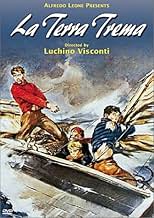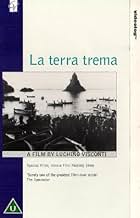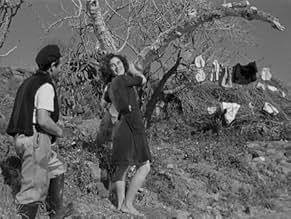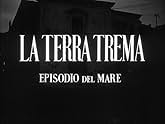IMDb RATING
7.8/10
5.9K
YOUR RATING
In rural Sicily, the fishermen live at the mercy of the greedy wholesalers. One family risks everything to buy their own boat and operate independently.In rural Sicily, the fishermen live at the mercy of the greedy wholesalers. One family risks everything to buy their own boat and operate independently.In rural Sicily, the fishermen live at the mercy of the greedy wholesalers. One family risks everything to buy their own boat and operate independently.
- Director
- Writers
- Stars
- Awards
- 1 win & 1 nomination total
Luchino Visconti
- Narrator
- (voice)
- (uncredited)
Antonio Pietrangeli
- Narrator
- (voice)
- (uncredited)
Antonio Arcidiacono
- Ntoni
- (uncredited)
Giuseppe Arcidiacono
- Cola
- (uncredited)
Venera Bonaccorso
- La vecchia che ride
- (uncredited)
Nicola Castorino
- Nicola
- (uncredited)
Rosa Catalano
- Rosa
- (uncredited)
Rosa Costanzo
- Nedda
- (uncredited)
Alfio Fichera
- Michele
- (uncredited)
Carmela Fichera
- La baronessa
- (uncredited)
Agnese Giammona
- Lucia
- (uncredited)
Nelluccia Giammona
- Mara
- (uncredited)
Ignazio Maccarone
- Maccarone
- (uncredited)
Giovanni Maiorana
- Un bambino
- (uncredited)
Antonino Micale
- Vanni
- (uncredited)
Maria Micale
- La madre
- (uncredited)
- Director
- Writers
- All cast & crew
- Production, box office & more at IMDbPro
Featured reviews
Luchino Visconti was a great Italian master director who along with Roberto Rossellini and Vittorio De Sica, is regarded as one of the pioneers of Italian Neorealism. 'Ossessione' was Visconti's first film and in some quarters it is hailed as the first neo-realist film ever made. Whether 'Ossessione' should be considered a neo-realist film or not is debatable, but if ever a film epitomised the Italian neo- realist experience, in my mind it is 'La Terra Trema'(along with a few others). It tells the story of the exploitation of the working-class fishermen in Aci Trezza by focusing on one particular family, the Valastros.
There are some films where the philosophies and sensibilities of the filmmaker can be skewed to the left or maybe the right. But in the case of 'La Terra Trema', saying that Visconti's stance on the issue of the condition and the treatment of the fishermen in Aci Trezza is skewed to the left is a huge understatement. Visconti addresses the issue by showcasing a ruthlessly damning indictment of the wholesalers and the capitalist social structure as a whole and its effect on the poor and the helpless. Visconti authentically depicts the hard and brutal life led by the working-class families who live under pressure to earn a living. They have to get up each day, they men and women have to embark on a cyclical routine of mundane activities with the hope of earning the meager amount which will earn them their food for the next day. We see the wholesalers exploit the fishermen by offering them low prices for the fish that they catch putting their lives on the line. The Valastros try to break open from this never-ending cycle of oppression and inadequacy by deciding to deviate from the market structure and work independently. But Visconti shows that the cruel and expensive nature of their work coupled with the all encompassing market structure will inevitably render all ambitious attempts of independence futile in the long run.
The film starts in a very documentary-like manner. We start at the stroke of dawn with bells ringing in the distance. Hordes of fishermen are seen flocking towards beaches. But we don't see faces. We see these figures in the darkness of dawn walking around. One of the primary characters in the film, Mara then is seen opening the door of the Valastros' house and that in a thematic sense introduces us to the characters that enrich this world. This gets juxtaposed beautifully with the shot that ends the film where the Valastros again become a part of the faceless masses.
Visconti before starting to make films on his own, used to work as an assistant to the great French auteur Jean Renoir and I saw Renoir's influence all over 'La Terra Trema'. The slick camera movement to reveal characters who were off screen, the humanism and the imagery is heavily inspired by Renoir. Visconti uses the trademark Renoir frame within a frame composition extensively throughout the film which almost gives a 3-d like feel to the images. There are so many beautiful images in the film that will stay with me. But my favourite image is the shot of the three women standing on the rocks and looking out at the sea. It is haunting, evocative and gorgeous. The grand and expansive photography involved in capturing the sea and beaches gets beautifully juxtaposed by the claustrophobic nature of the shots inside the Valastros' home.
The fact that Visconti used the real people of Aci Trezza in the film instead of professional actors actually lends a bit of authenticity. Yes Visconti uses visual style and flair, but he never does it by compromising the human element of the film. Yes with amateurs at the helm, the acting is a bit stiff at times, but considering what Visconti is going for, the intentions are noble and the viewer can easily look past it.
My only problem with the film which prevents me from giving the film a perfect 10 involves a scene that comes close to the end of the film where the wholesalers start mocking Antonio. This is a scene where the tone gets a little too over-the-top and goofy which didn't fit with the realism of the rest of the film. I think, a little subtlety and sarcasm would have worked better. The relentless laughter could have been replaced by snide sarcastic remarks.
'La Terra Trema' is a beautiful depiction of humanity in its most raw, helpless state. Visconti attacks the capitalist system by showcasing its harsh effects on the poor. The film isn't a very hopeful one, but considering the time during the which it was made, the pessimism is warranted. The plight of Valastros family and Antonio in particular reminded me of the story of Icarus. In their quest for freedom from oppression, they ended up flying a little too close to the sun.
There are some films where the philosophies and sensibilities of the filmmaker can be skewed to the left or maybe the right. But in the case of 'La Terra Trema', saying that Visconti's stance on the issue of the condition and the treatment of the fishermen in Aci Trezza is skewed to the left is a huge understatement. Visconti addresses the issue by showcasing a ruthlessly damning indictment of the wholesalers and the capitalist social structure as a whole and its effect on the poor and the helpless. Visconti authentically depicts the hard and brutal life led by the working-class families who live under pressure to earn a living. They have to get up each day, they men and women have to embark on a cyclical routine of mundane activities with the hope of earning the meager amount which will earn them their food for the next day. We see the wholesalers exploit the fishermen by offering them low prices for the fish that they catch putting their lives on the line. The Valastros try to break open from this never-ending cycle of oppression and inadequacy by deciding to deviate from the market structure and work independently. But Visconti shows that the cruel and expensive nature of their work coupled with the all encompassing market structure will inevitably render all ambitious attempts of independence futile in the long run.
The film starts in a very documentary-like manner. We start at the stroke of dawn with bells ringing in the distance. Hordes of fishermen are seen flocking towards beaches. But we don't see faces. We see these figures in the darkness of dawn walking around. One of the primary characters in the film, Mara then is seen opening the door of the Valastros' house and that in a thematic sense introduces us to the characters that enrich this world. This gets juxtaposed beautifully with the shot that ends the film where the Valastros again become a part of the faceless masses.
Visconti before starting to make films on his own, used to work as an assistant to the great French auteur Jean Renoir and I saw Renoir's influence all over 'La Terra Trema'. The slick camera movement to reveal characters who were off screen, the humanism and the imagery is heavily inspired by Renoir. Visconti uses the trademark Renoir frame within a frame composition extensively throughout the film which almost gives a 3-d like feel to the images. There are so many beautiful images in the film that will stay with me. But my favourite image is the shot of the three women standing on the rocks and looking out at the sea. It is haunting, evocative and gorgeous. The grand and expansive photography involved in capturing the sea and beaches gets beautifully juxtaposed by the claustrophobic nature of the shots inside the Valastros' home.
The fact that Visconti used the real people of Aci Trezza in the film instead of professional actors actually lends a bit of authenticity. Yes Visconti uses visual style and flair, but he never does it by compromising the human element of the film. Yes with amateurs at the helm, the acting is a bit stiff at times, but considering what Visconti is going for, the intentions are noble and the viewer can easily look past it.
My only problem with the film which prevents me from giving the film a perfect 10 involves a scene that comes close to the end of the film where the wholesalers start mocking Antonio. This is a scene where the tone gets a little too over-the-top and goofy which didn't fit with the realism of the rest of the film. I think, a little subtlety and sarcasm would have worked better. The relentless laughter could have been replaced by snide sarcastic remarks.
'La Terra Trema' is a beautiful depiction of humanity in its most raw, helpless state. Visconti attacks the capitalist system by showcasing its harsh effects on the poor. The film isn't a very hopeful one, but considering the time during the which it was made, the pessimism is warranted. The plight of Valastros family and Antonio in particular reminded me of the story of Icarus. In their quest for freedom from oppression, they ended up flying a little too close to the sun.
A Marxist aristocrat, Count Don Luchino Visconti Di Morone was widely praised for both the realism and vaguely politicized tone of his early films, and the operatic sumptuousness of his later historical costume dramas... Throughout his career, however, style dominated content; all too often, the result was camp, decorative melodrama disguised as solemn, socially significant art...
"La Terra Trema," an epic account of the hardship suffered by Sicilian fishermen, was even closer to Neo-realism, shot on location with a cast of nonprofessional actors living their lives on screen... Its somewhat simplistic Marxist message, that the peasants' real enemy was not Nature but exploitive businessmen, was in fact less indicative of Visconti's future and its use of a disintegrating family to mirror the social climate of Italy as a whole...
The conflicts, misery, poverty, joy, and anger in a fishing village are shown in a panoramic study of man and earth...
'The Earth will Tremble' is not political nor intends to teach... The film reveals... it doesn't judge...
The cinematography is outstanding, particularly the scenes with the fishermen at sea...
"La Terra Trema," an epic account of the hardship suffered by Sicilian fishermen, was even closer to Neo-realism, shot on location with a cast of nonprofessional actors living their lives on screen... Its somewhat simplistic Marxist message, that the peasants' real enemy was not Nature but exploitive businessmen, was in fact less indicative of Visconti's future and its use of a disintegrating family to mirror the social climate of Italy as a whole...
The conflicts, misery, poverty, joy, and anger in a fishing village are shown in a panoramic study of man and earth...
'The Earth will Tremble' is not political nor intends to teach... The film reveals... it doesn't judge...
The cinematography is outstanding, particularly the scenes with the fishermen at sea...
It's hard to believe that I am the first person to comment on this masterpiece at this website. One reason could be that it's not that easy to see. Thank God for Turner Classic Movies, which is where I finally saw it. I'm happy to see that there's a DVD available.
This is one of those amazing films that uses only non-professionals and in which they perform as well, if not better, than any professional could. The actors are the inhabitants of a small Sicilian fishing village. The film is cliche-ridden (the Marxist variety) and at times predictable. I didn't care about any of this. The film is a true epic about a few people trying to break out of their rut of exploitation and the wretchedness of their everyday living, and failing. The film thus achieves the status of true tragedy. This one shouldn't be missed.
This is one of those amazing films that uses only non-professionals and in which they perform as well, if not better, than any professional could. The actors are the inhabitants of a small Sicilian fishing village. The film is cliche-ridden (the Marxist variety) and at times predictable. I didn't care about any of this. The film is a true epic about a few people trying to break out of their rut of exploitation and the wretchedness of their everyday living, and failing. The film thus achieves the status of true tragedy. This one shouldn't be missed.
Although it was supposed to be a documentary, Visconti put in a slight story line to achieve what a documentary would have done, AND MORE. --He used no professional actors, just native Sicilian fishermen, and other villagers, to play all parts. -- The film uses no artificial lighting, no sound enhancement, sound-effects, or dubbing. -- It was filmed on location in, and around, the crumbling homes of the poor villagers, and it was recorded in the Sicilian dialect (rather than proper Italian), and although it has a documentary "look", Visconti shows the exploitation of the poor by the capitalist middlemen so much more effectively than any documentary could have done.
-- Also, while not the first neo-realist film of that post-war Italian genre, this was the first film to be described by the term: "neo-realist". --A brilliant film on all counts. I rated it "10".
-- Also, while not the first neo-realist film of that post-war Italian genre, this was the first film to be described by the term: "neo-realist". --A brilliant film on all counts. I rated it "10".
I saw this movie Friday night on TCM. I'd never heard of it, but I'm a neorealismo fan, so I watched. I'm sorry I didn't tape it, what an epic! Like "The bicycle thief," this movie uses real people, and almost feels like a documentary at times. I agree that the sentiments are rather marxist, but I have to admit that if I lived as these people do, I might be drawn to communism, too. There are some subtle (or maybe not so subtle) references to the politics of the times, wall posters about Mussolini and the hammer and sickle images painted on the walls. Oddly, this movie reminded me somewhat of "Man of Aran," the images are that stark, life is that bleak. The film is beautifully shot, and the story is wrenching. Watch it if you get the opportunity. It memorializes a way of life that is gone, and I'll bet there's not a single person who misses it.
Did you know
- TriviaThe cast was exclusively composed of non-professional actors. They were genuine fishermen and inhabitants of Aci Trezza (Sicily). The credits do not name any of the actors, who are collectively listed as "Pescatori Siciliani" (Sicilian Fishermen).
- Quotes
Title Card: [in Italian] In Sicily, Italian is not the language of the poor.
- Alternate versionsWas originally released without Italian narration, but it flopped because the Italian audience could not understand the Sicilian dialect. Visconti re-released it with his own narration, which many find detracts from the film.
- ConnectionsEdited into Bellissimo: Immagini del cinema italiano (1985)
- How long is La Terra Trema?Powered by Alexa
Details
- Runtime2 hours 32 minutes
- Color
- Aspect ratio
- 1.37 : 1
Contribute to this page
Suggest an edit or add missing content























